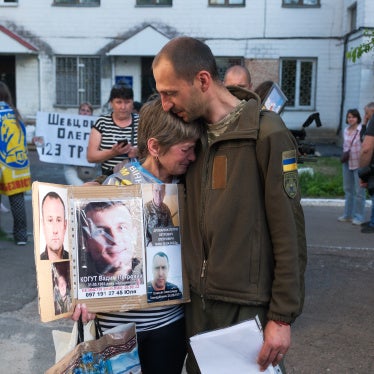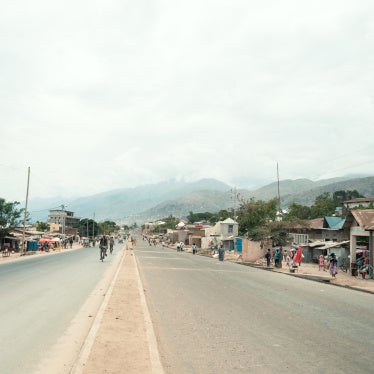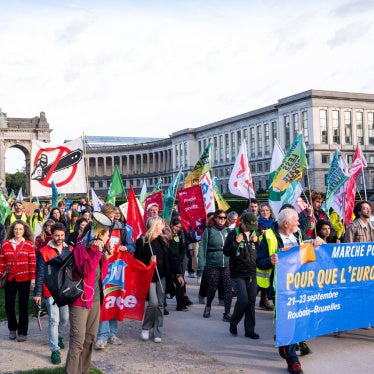Chairman Casey, Ranking Member Risch, and Committee Members:
Thank you for the opportunity to submit written testimony on US policy and the human rights crisis in Syria.
Since largely peaceful protests in Syria began on March 18, 2011, the Syrian security forces, under the command of President Bashar al Assad, have been engaged in a relentless crackdown. According to the United Nations, more than 3,500 people, largely civilians, have been killed, while tens of thousands more have been arrested, detained, forcibly disappeared, and tortured.
The government has also blocked access for most international human rights monitors and foreign journalists, and has imposed a tight information blockade. Human Rights Watch conducted interviews with hundreds of residents who have escaped to neighboring countries and spoke to many witnesses still inside Syria. We have documented systematic, widespread, and gross violations of human rights by the Syrian government, which may amount to crimes against humanity.
Syria has blatantly flouted its commitments, under a recent Arab League-sponsored deal, to cease the violence, withdraw all troops from cities and towns, and allow access to journalists and Arab League monitors. Due to ongoing restrictions on independent monitors, Human Rights Watch has had difficulty verifying specific information on the latest spate of killings. But it is clear that the last week has seen an intensification of the violence, with reports of mounting deaths as part of a renewed government crackdown, particularly on the city of Homs.
Predictably, the Syrian government has consistently denied the abuses. Syrian officials accuse “terrorist groups” or “armed gangs” of causing the violence. They inconsistently and vaguely claim that the armed gangs are responsible for the deaths of protesters, or that the armed gangs have attacked security forces, leading the security forces at times to kill residents by mistake.
Human Rights Watch research indicates that the protests have been overwhelmingly peaceful. We have documented a few instances in which civilians and armed defectors used force, including deadly violence against security forces. But while these incidents should be fully investigated, they can in no way justify the systematic violence of the Syrian security forces against their own people.
The decision of some protesters and defectors to arm themselves and fight back, shooting at security forces, shows that the strategy adopted by Syria’s authorities has dangerously provoked escalation in the level of violence, and highlights the need for an immediate cessation of lethal force against peaceful protests lest the country slip into bloodier conflict. The protests themselves were sparked partly by the developments in Tunisia and Egypt. But they are mostly a local response to four decades of government repression, by a population that could no longer tolerate the heavy hand of Syria’s security services. Despite the government’s ongoing killings and torture, the protests have continued to escalate throughout the country, and they are unlikely to go away anytime soon.
That means that the international community, including the United States, faces the difficult challenge of bringing pressure to bear on the government of Assad to stop the abuses and ensure that civilians are protected.
So far, the US response has been largely positive and helpful. In public statements, President Obama has condemned the Syrian government’s brutality and clearly expressed support for “a transfer of power that is responsive to the Syrian people,” most recently in his September 21, 2001 speech before the UN General Assembly.
The United States has also taken direct action. The Treasury Department has imposed targeted sanctions on senior Syrian officials, including Syria’s Foreign Minister, which ban Americans from doing business with these individuals and block any assets they may have in this country. The United States has also imposed sanctions on Syria’s oil sector, banning the importation of petroleum products from Syria.
Ambassador Robert Ford’s performance within Syria has also been very helpful, and sets an example for how US Ambassadors should conduct themselves in repressive societies: speaking out publicly, engaging with civil society and opposition groups, and personally traveling to areas affected by the crackdown to show solidarity with Syrians who are asking for their human rights. We urge Congress to ask why the State Department does not encourage its Ambassadors to other comparable countries to adopt a similar approach.
International Action on Syria
UN Human Rights Council Resolutions
Internationally, the US has played an important role in pressing for action, including by sponsoring a special session on Syria at the UN Human Rights Council (HRC) in April, which called on the Office of the UN High Commissioner for Human Rights (OHCHR) to conduct a mission to investigate events in Syria. While OHCHR was not granted access to Syria, it was able to release a report in August, finding “a pattern of human rights violations that constitutes widespread or systematic attacks against the civilian population, which may amount to crimes against humanity.”
Also during the August session of the Human Rights Council, the United States backed a European Union-sponsored resolution on Syria that unequivocally condemns the Syrian government abuses and calls for them to end. The resolution also established a Commission of Inquiry (CoI) charged with investigating the abuses, identifying those responsible, and reporting back to the HRC. The CoI report will also be transmitted to the UN General Assembly. This resolution was an important political signal, as it received a much broader support at the HRC than the April resolution. Only 4 states voted against the resolution (Ecuador, China, Russia and Cuba), while a broad majority of 33 HRC members voted in favor of it.
The Commission of Inquiry, which has received no co-operation from Syria so far, is required to publish its report by the end of November 2011 and to update it in March 2012.
Veto at UN Security Council
Unfortunately, other governments have succeeded in blocking effective action at the UN Security Council.
On August 18, United Nations High Commissioner for Human Rights Navi Pillai asked the Security Council to refer Syria to the International Criminal Court for the investigation of alleged atrocities against anti-government protestors. Just before Pillai’s deposition, US President Barack Obama and the European Union had recommended sanctions and called on Assad to step down.
But despite these reports and statements, on October 4, after seven months of near complete inaction, Russia and China vetoed a Security Council resolution calling on Syria to end the violence against its citizens.
India, Brazil, and South Africa abstained from the vote, invoking concerns that the condemnatory resolution might lead to the imposition of sanctions (and expressing concern over NATO action in Libya, which they viewed as exceeding its mandate), while claiming to be deeply concerned about the plight of the Syrian people. These three countries have so far opted for a softer approach on Syria: in August, they sent a delegation to Syria with the aim of encouraging the Syrian government to exercise restraint and to initiate talks with the opposition. In later public statements they said they had called for an end to the violence and respect for human rights.
Arab League Initiative
Yet more recently the League of Arab States has taken action. An Arab League delegation led by Qatar and made up of the foreign ministers of Egypt, Oman, Algeria and Sudan as well as Nabil el-Araby, the league’s secretary general, visited Syria in October. Russia expressed support for the initiative.
On November 2, the Arab League announced that it had reached a deal with the Syrian government that required Syria to halt all acts of violence and protect Syrian citizens, release all those detained in connection with the protests, remove security forces from cities and residential neighborhoods, and grant field access to organizations of the Arab League and to the international media to monitor the situation.
If Syria had respected the deal, this would have represented an important step forward. But after reportedly releasing about 500 detainees on the occasion of the holiday of Eid al-Adha, the Syrian government has continued its crackdown. According to the UN High Commissioner for Human Rights, more than 60 people are reported to have been killed by military and security forces since Syria signed the Arab League deal. These include at least 19 on the Sunday that marked Eid al-Adha.
Next Steps
The Arab League’s response during an emergency meeting this Saturday to Syria’s failure to fulfill the terms of its deal may be an important turning point. Depending on the position they take, it is possible that not only the Arab League states but also countries like India, Brazil and South Africa, could be persuaded to support stronger measures on Syria. Given Russia’s support for the Arab League initiative, it too, should support an escalation of international pressure on Syria.
Human Rights Watch has called upon the General Assembly to take action where the Security Council has failed to do so. Resolution 377A of the UN General Assembly states that “if the Security Council, because of lack of unanimity of the permanent members, fails to exercise its primary responsibility for the maintenance of international peace and security […], the General Assembly shall consider the matter immediately.” We have urged the General Assembly to also ask the UN Secretary-General to name a special envoy for Syria, as well as refer the upcoming report of the Commission of Inquiry back to the UN Security Council for further consideration.
Aside from action at the United Nations, we have successfully urged the European Union, to impose additional sanctions, including by freezing the assets of the Syrian National Oil Company, Syrian National Gas Company, and the Central Bank of Syria until the Syrian government ends gross human rights abuses against its citizens.[1]The EU has also frozen the assets of 35 Syrian officials and four entities in response to Syria’s widespread human rights abuses. The EU imposed similar assets freezes against the Libyan oil sector and central bank in March.
It may be that no amount of international pressure will have an immediate effect. But over time, we believe that coordinated international sanctions, including those that target specific individuals, can weaken support for the government’s abuses among key political groups.
Key Recommendations:
There are a number of concrete measures that the international community, including the United States, can take to protect civilians in Syria. We urge the United States to work with its allies, particularly its allies in the Arab world, to achieve the following goals:
- Granting Unhindered Access to Independent Observers: As reporting on Syria gets more difficult and countries interpret events on the ground very differently, there is a need for independent observers on the ground who can document and publicize what is happening. The US government and its allies should push the Syrian government to allow the Commission of Inquiry appointed by the Human Rights Council to have access to the country and ensure full cooperation from the Syrian authorities in conducting its investigations.
- Deployment of Monitors: Another step that could make a difference on the ground immediately is the deployment of human rights monitors in Syria. An independent monitoring presence could help clarify the situation on the ground, ensure rapid responses to violations reports, and provide reliable reporting concerning ongoing violations, as well as addressing such issues as the extent of use of force by protesters. In addition, a monitoring presence in hotspots within Syria could lead the security forces to use greater restraint and reduce the level of violations itself.
- Timetable for Implementing Reforms: President Assad’s promises of reform are not credible as long as security forces are shooting at protesters and detaining activists. The international community needs to set a timetable for reforms and hold the Syrian authorities accountable for respecting the timetable. Some reforms should be immediate, such as the release of all detainees held merely for peaceful protest or political activity, and an accounting for all those detained and being held incommunicado.
- Preventing Syria from Obtaining Surveillance Technologies: recent reports indicate that Syria is in the process of constructing an elaborate surveillance network to track the communications and activities of its citizens.[2] To set up the system, it needs to obtain specific surveillance technologies from a number of western countries, including the United States. These countries should be actively looking for ways to discourage or prevent the sale of such technologies to Syria. The US Congress should ensure that existing US sanctions and export controls are adequate to address this situation, and urge other countries, particularly in the European Union, to adopt similar restrictions on Syria. Going forward, the US Congress should examine US export control laws and regulations to ensure that surveillance and other technology cannot be sold to governments likely to use it against their citizens or to further repression.
Finally, we urge the US government to support UN General Assembly action on Syria, including the establishment of a UN Special Envoy on Syria and support referral of the CoI report to the UN Security Council for further action. We also hope the United States will provide meaningful and public support for the work of the Human Rights Council, its Commission of Inquiry, and the OHCHR in Syria, and undertake to follow up on reports and recommendations emanating from the UN human rights organs.
[1]Under Syrian law the government is the major shareholder in the oil and gas sector through its ownership of the Syrian National Gas and Syrian National Oil companies. These two companies have a 50 percent share in every oil and gas project in Syria. In a March 2010 report, the International Monetary Fund estimated that the Syrian government earns approximately €2.1 billion from oil and gas revenues per year. Most of Syria’s oil and gas is used domestically, but it exports about 150,000 barrels per day, and around 95 percent of that goes to Europe, primarily to Italy, the Netherlands, France, and Germany. We have urged the EU to conduct regular reviews of the impact of sanctions to assess any potential humanitarian impact, and to tie the lifting of the sanctions to measures that demonstrate a change of policy by the government, such as an end to the use of excessive and lethal force against peaceful demonstrators, releasing all detainees held merely for participating in peaceful protests or for criticizing the Syrian authorities, and full cooperation with the fact-finding mission mandated by the United Nations Human Rights Council or other international mechanisms tasked with investigating alleged human rights violations.
[2]See Syria Crackdown Gets Italy Firm’s Aid with U.S.-Europe Spy Gear, Bloomberg News, November 3, 2011 (available athttp://www.bloomberg.com/news/2011-11-03/syria-crackdown-gets-italy-firm...).





